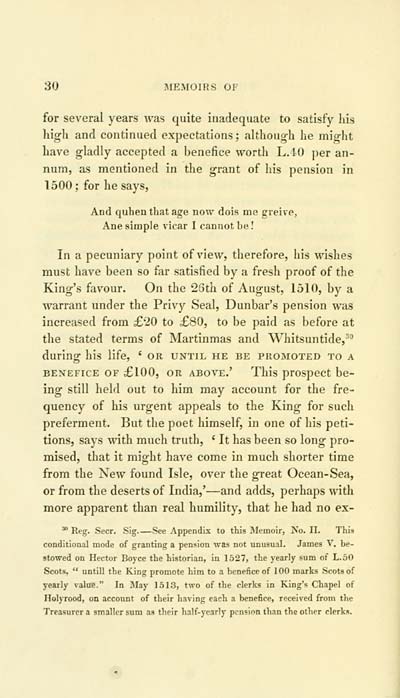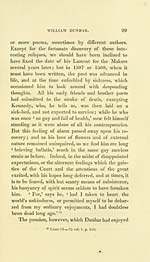Download files
Complete book:
Individual page:
Thumbnail gallery: Grid view | List view

30 MEMOIHS OF
for several years was quite inadequate to satisfy his
high and continued expectations; although he might
have gladly accepted a benefice worth L.iO per an-
num, as mentioned in the grant of his pension in
1500; for he says,
And quhen that age now dois mo. gieive,
Ane simple vicar I cannot b« I
In a pecuniary point of view, therefore, his wishes
must have been so far satisfied by a fresh proof of the
King's favour. On the 2Sth of August, 1510, by a
warrant under the Privy Seal, Dunbar's pension was
increased from £'20 to £80, to be paid as before at
the stated terms of Martinmas and Whitsuntide,^"
during his life, ' or until he be promoted to a
BENEFICE OF £100, OR ABOVE.' This prospcct be-
ing still held out to him may account for the fre-
quency of his urgent appeals to the King for such
preferment. But the poet himself, in one of his peti-
tions, says with much truth, ' It has been so long pro-
mised, that it might have come in much shorter time
from the New found Isle, over the great Ocean- Sea,
or from the deserts of India,' — and adds, perhaps with
more apparent than real humility, that he had no ex-
*• Reg. Seer. Sig See Appendix to this Memoir, No. II. Thi8
conditional mode of granting a pension was not unusual. James V, be-
stowed on Hector Boyce the historian, in 1527, the yearly sum of L.50
Scots, " untill the King promote him to a benefice of 100 marks Scots of
yearly value." In May 151.3, two of the clerks in King's Chapel of
Holyrood, on account of their having each a benefice, received from the
Treasurer a smaller sum as their half-yearly pension than the other clerks.
for several years was quite inadequate to satisfy his
high and continued expectations; although he might
have gladly accepted a benefice worth L.iO per an-
num, as mentioned in the grant of his pension in
1500; for he says,
And quhen that age now dois mo. gieive,
Ane simple vicar I cannot b« I
In a pecuniary point of view, therefore, his wishes
must have been so far satisfied by a fresh proof of the
King's favour. On the 2Sth of August, 1510, by a
warrant under the Privy Seal, Dunbar's pension was
increased from £'20 to £80, to be paid as before at
the stated terms of Martinmas and Whitsuntide,^"
during his life, ' or until he be promoted to a
BENEFICE OF £100, OR ABOVE.' This prospcct be-
ing still held out to him may account for the fre-
quency of his urgent appeals to the King for such
preferment. But the poet himself, in one of his peti-
tions, says with much truth, ' It has been so long pro-
mised, that it might have come in much shorter time
from the New found Isle, over the great Ocean- Sea,
or from the deserts of India,' — and adds, perhaps with
more apparent than real humility, that he had no ex-
*• Reg. Seer. Sig See Appendix to this Memoir, No. II. Thi8
conditional mode of granting a pension was not unusual. James V, be-
stowed on Hector Boyce the historian, in 1527, the yearly sum of L.50
Scots, " untill the King promote him to a benefice of 100 marks Scots of
yearly value." In May 151.3, two of the clerks in King's Chapel of
Holyrood, on account of their having each a benefice, received from the
Treasurer a smaller sum as their half-yearly pension than the other clerks.
Set display mode to: Large image | Transcription
Images and transcriptions on this page, including medium image downloads, may be used under the Creative Commons Attribution 4.0 International Licence unless otherwise stated. ![]()
| Early Gaelic Book Collections > J. F. Campbell Collection > Poems of William Dunbar > Volume 1 > (50) |
|---|
| Permanent URL | https://digital.nls.uk/81329015 |
|---|
| Description | Volume first. |
|---|---|
| Shelfmark | Cam.2.e.18 |
| Additional NLS resources: | |
| Attribution and copyright: |
|
| Description | Now first collected with notes, and a memoir of his life by David Laing. |
|---|---|
| Shelfmark | Cam.2.e.18-19 |
| Additional NLS resources: | |
| Description | Volumes from a collection of 610 books rich in Highland folklore, Ossianic literature and other Celtic subjects. Many of the books annotated by John Francis Campbell of Islay, who assembled the collection. |
|---|
| Description | Selected items from five 'Special and Named Printed Collections'. Includes books in Gaelic and other Celtic languages, works about the Gaels, their languages, literature, culture and history. |
|---|

